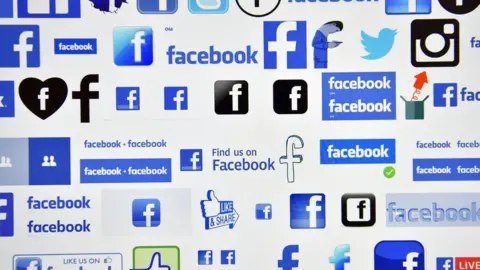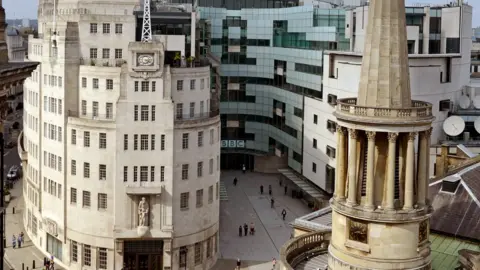Facebook and Google news should be regulated, Cairncross Review says
A regulator should oversee tech giants like Google and Facebook to ensure their news content is trustworthy, a government-backed report has suggested.
The Cairncross Review into the future of UK news said such sites should help users identify fake news and "nudge people towards news of high quality".
The review also said Ofcom should assess the BBC's impact on online news on other providers.
In addition, the report called for a new Institute for Public Interest News.
Such a body, it said, could work in a similar way to the Arts Council, channelling public and private funding to "those parts of the industry it deemed most worthy of support".
 AFP/Getty Images
AFP/Getty ImagesThe independent review, undertaken by former journalist Dame Frances Cairncross, was tasked with investigating the sustainability of high-quality journalism.
Its recommendations include measures to tackle "the uneven balance of power" between news publishers and online platforms that distribute their content.
Services such as Facebook, Google and Apple should continue their attempts to help readers understand how reliable a story is, and the process that decides which stories are shown should be more transparent, it says.
"Their efforts should be placed under regulatory scrutiny - this task is too important to leave entirely to the judgment of commercial entities," according to the report.
 Getty Images
Getty ImagesA regulator would initially only assess how well these sites are performing - but if this doesn't work, the report warns "it may be necessary to impose stricter provisions".
Yet the report falls short of requiring Facebook, Google and other tech giants to pay for the news they distribute via their platforms.
Dame Frances told the BBC's media editor Amol Rajan that "draconian and risky" measures could result in firms such as Google withdrawing their news services altogether.
"There are a number of ways we have suggested technology companies could behave differently and could be made to behave differently," she said.
"But they are mostly ways that don't immediately involve legislation."
BBC's impact
The review was not asked to comment specifically on the BBC but concluded that curtailing the corporation's news offering would be counter-productive after hearing arguments from other publishers that the BBC reporting on so-called "soft content" online was crowding out other news providers.
The review noted that the BBC Charter states the corporation should endeavour to reach all demographics, and that stories of this type are essential to appeal to an increasingly elusive younger audience.
The BBC also argues that "soft content" stories may attract users who might then click onwards to a public-interest news story.
The review said the BBC was delivering high quality journalism but suggested it "could do more and think more carefully about how its news provision can act as a complement, rather than a substitute, for private news provision".
Dame Frances also recommended an exploration of the market impact of BBC News, conducted by broadcasting regulator Ofcom, to find whether it is 'striking the right balance' and driving traffic to other, commercial providers.
The BBC should do more to share its technical and digital expertise for the benefit of local publishers, the report concluded.

Shadow Culture Secretary Tom Watson urged the government to tackle Google and Facebook's "duopoly" in the digital advertising market, and said Dame Frances was "barking up the wrong tree" in recommending an inquiry into the BBC's online news output.
Meanwhile, former director general of the BBC Greg Dyke defended the role of the corporation.
He told BBC Radio 4's Today programme: "It seems to me that at a time when large American media companies - the likes of Netflix and the rest of it - are going to come to dominate in the world, for the BBC to be cutting back on anything will be a mistake.
"The importance of the BBC is going to grow in the next 10 years, not decline."


Frances Cairncross earned widespread respect as a journalist for her hard-headed and pragmatic approach to economics.
That pragmatism is the very reason the government commissioned her to look at the future of high-quality news - and also the reason many in local and regional media will be disappointed by her recommendations.
What is most notable about her review is what it doesn't do.
- It doesn't suggest all social media should be regulated in the UK
- It doesn't suggest social media companies pay for the privilege of using news content
- It doesn't suggest social media companies be treated as publishers, with legal liability for all that appears on their platform
This is because the practicalities of doing these things are difficult, and experience shows that the likes of Google will simply pull out of markets that don't suit them.
There are concrete measures that could boost local news, from tax relief to an extension of the Local Democracy Reporting Service.
And Dame Frances certainly seemed cognisant of the argument that BBC News has over-reached, to the extent that it is harming the commercial sector. But this is a matter for Ofcom.
Ultimately, as this report acknowledges, when it comes to news, convenience is king. The speed, versatility and zero cost of so much news now means that, even if it is of poor quality, a generation of consumers has fallen out of the habit of paying for news.
But quality costs. If quality news has a future, consumers will have to pay. That's the main lesson of this report.

The report recommends "new codes of conduct" whose implementation would be supervised by a regulator "with powers to insist on compliance".
Other recommendations included:
- Tax relief to encourage the provision of local journalism
- Expanding financial support for local news by extending the BBC's Local Democracy Reporting Service
- An investigation of the online advertising market, conducted by the Competition and Markets Authority, to ensure fair competition
 Getty Images
Getty ImagesOne local newspaper editor welcomed the report's recommendations but said it "comes too late for so many once proud and important community newspapers".
The Yorkshire Post's James Mitchinson said: "The various fiscal reviews and recommendations... must come quickly... if we are to turn the Cairncross Review into something which we look back upon as being instrumental in preserving what we do for generations to come."
Culture Secretary Jeremy Wright said some of its suggestions could be acted upon "immediately", while others would need "further careful consideration".

Follow us on Facebook, on Twitter @BBCNewsEnts, or on Instagram at bbcnewsents. If you have a story suggestion email [email protected].
